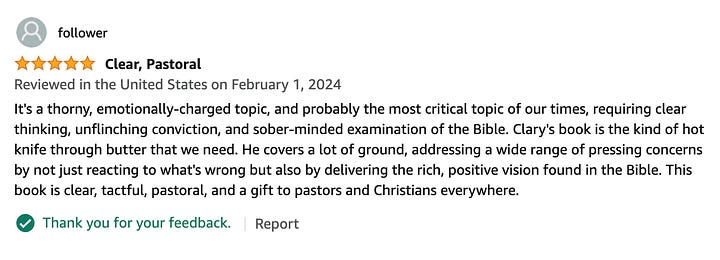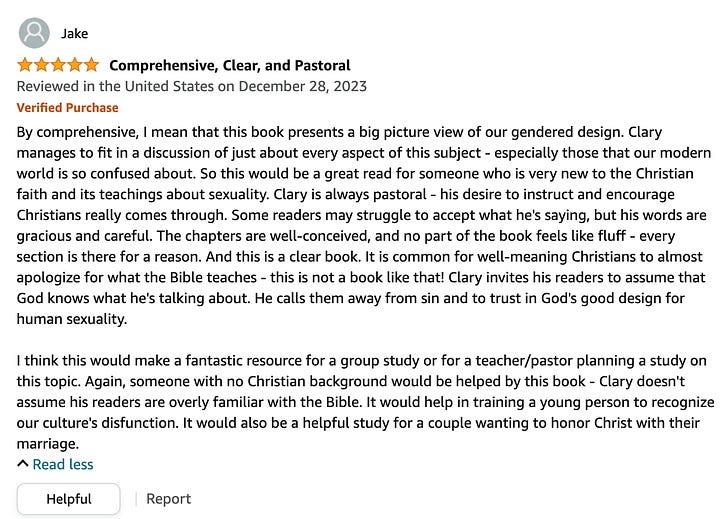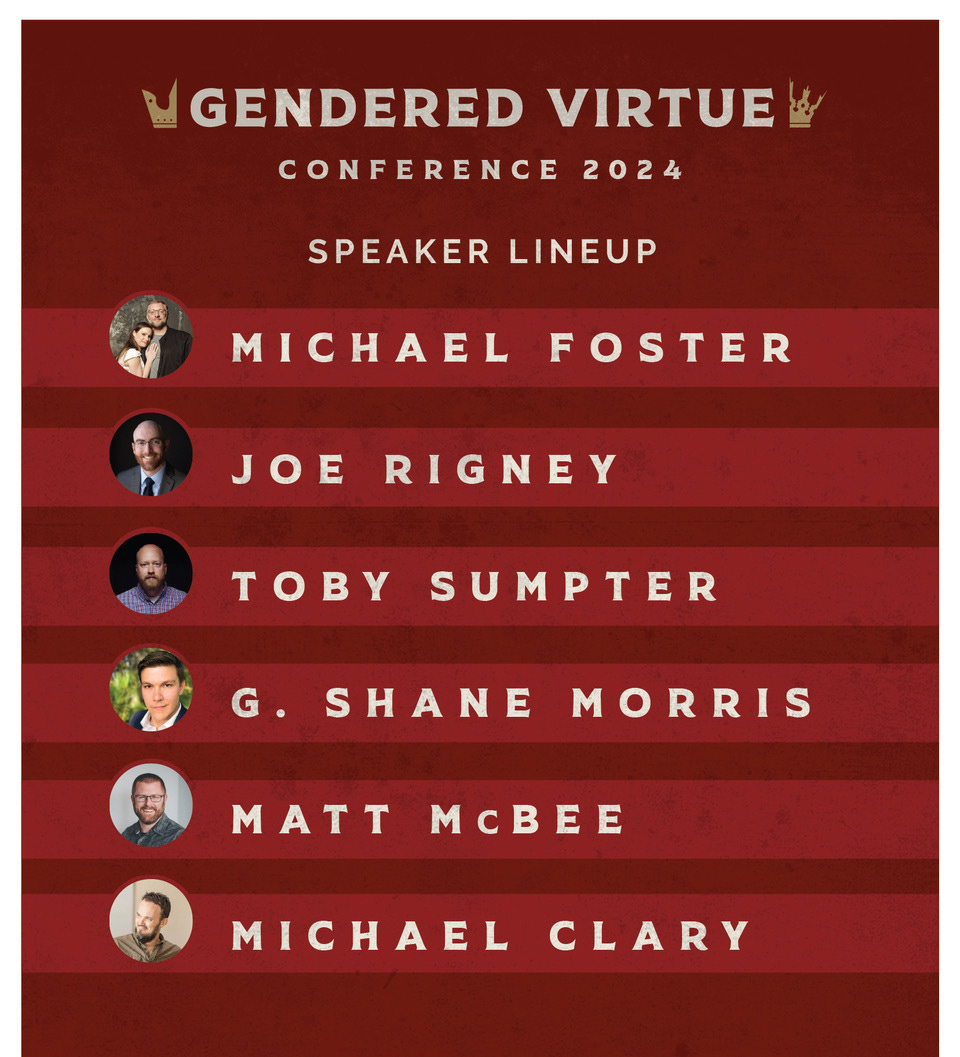“The tyrant is the least free man, because he is slave to his desires.” - Socrates
In the ancient world, virtue was a hot topic. What makes someone virtuous? Ancient Greeks believed that virtue was bound up with freedom, because freedom should always be directed towards the pursuit of virtue. Virtue was eleological, something beyond you that you were meant to pursue. People become virtuous by freely pursuing higher and more noble ideals for themselves and for society.
The word “virtue” evokes a sense of duty and the pursuit of excellence. Virtue is not so much about avoiding particular sins, although that’s part of it. Since virtue is something freely expressed, the greater part of virtue is imaginative. It’s a matter of prayerfully considering, “what kind of person does God want me to be?” Or more specifically, “what kind of man or woman am I becoming?” Or, “of all the possibilities that lie before me, what’s the best version of myself?”
The pursuit of virtue will be different for men and for women. Not in every way, but in many, important ways, because God designed our sexual differences to serve distinct purposes, and virtue corresponds to that created purpose. It is plain from Scripture that men and women obey God in different ways and sin in different ways. But there is more. The most virtuous version of ourselves will reflect the uniqueness of our sexual design.
The most virtuous version of ourselves will reflect the uniqueness of our sexual design.
This has become a controversial belief in recent years, due to our culture’s constant messaging that men and women are mostly interchangeable. Unfortunately, the confusion of our culture has infiltrated the church. I have heard Christians say things like, “the fruit of the Spirit is the same for men and women.” I agree; yes and amen. There is not one list for men and a different list for women. However, the individual fruits of the Spirit will find different expressions in men and women. Take love, for example, which heads the list of the fruit of the Spirit. A man’s love is different than a woman’s love. Both men and women express love, but their love will lead them to take different actions. This is a good thing, because the body of Christ benefits from both masculine and feminine love.
Missing the Point
I once had a conversation with a church member who was the father of three girls and a son. Prompted by a recent news story, we were discussing the potential that girls might be required to register for the military draft to serve in active combat roles. This man told me that it would make no difference to him if his son or his daughters were drafted for active combat duty. In his mind, what’s the difference? Boys and girls are basically the same, and both are equally suitable candidates for military combat.
His opinion is common. After all, for decades movies and TV shows have depicted petite, warrior-like women fiercely defeating men in battle as though this were common. We’ve seen it so many times it’s easy to forget how unrealistic this is. If “life imitates art,” as it has been said, small wonder that women are now expected to be society’s warriors and protectors in the same way as men. Personally, I have one daughter and three sons. In my view, it would be honorable for my sons to serve in active combat duty if called upon, but not my daughter. Why? Because my sons are designed for it, but not my daughter.
Androgyny is Ugly
Androgyny is ugly. God made men and women different, and failure to recognize this basic fact cancels beauty and causes harm. The question of virtue is what do we do with the unique personality God gave us? I am not saying that Christian virtue is different for men and women in every possible way, but our differences do matter. A gender-neutral vision for humanity is gnostic, not Christian.
A gender-neutral vision for humanity is gnostic, not Christian.
Once we accept the premise that men and women were made differently, and for distinct purposes, a whole forest of implications arise. As William and Barbara Mouser once wrote, “Maleness and femaleness are written in our bodies, and masculinity and femininity are written in our souls. To be simply a ‘good person’ or a ‘bad person’ is not an option. If we are male, we must inevitably choose to be a good son, brother, man, husband, or father. If we are female, we must inevitably choose to be a good daughter, sister, woman, wife, or mother.” In other words, the creation order is renewed and redeemed in the Christian household, where grace restores and reorders what was corrupted by sin.
Men and women have a basic nature, and we are designed to move with the grain of that nature, not against it. Yet the world is aggressively pushing us in the opposite direction. The lines between the sexes are being blurred or even eliminated altogether. We are told to reject the “gender binary” and embrace an ever-growing continuum of genders.
Further, men and women are being encouraged to adopt patterns of behavior that more characterize the opposite sex. Men are encouraged to adopt more feminine patterns of behavior, while women are encouraged to adopt more masculine patterns of behavior. This creates a confusing cultural chaos as men and women increasingly deny their basic natures. We cannot pursue virtue if we deny our distinctions.
In the church, feminine character traits are often associated with virtue, while masculine traits are associated with vice. For example, strong-willed, independent, truth-oriented, and direct-speaking men are often considered arrogant, whereas passive, compliant, and egalitarian men are considered more Christlike. This is evident in modern worship music, where churches sing romanticized love songs to Jesus. These songs express feminine sensibilities as the embodiment of true Christianity. Small wonder many men don’t want to participate. Men don’t like to sing love songs to other men. So they stand there, expressionless, arms crossed, with a thousand-yard stare.
Masculine and Feminine Courage
Masculine virtue is courageous and zealous for God. Virtuous men make hard decisions. Virtuous men stand for biblical truth no matter how unpopular. Virtuous men know how and when to fight. Virtuous men use their masculine strength to serve God and protect those who are vulnerable. Of course, the call for men to be strong does not imply a call for women to be weak. Virtuous women may also be strong, but their strength will be expressed differently.
In C. S. Lewis’ classic children’s book, The Lion, the Witch, and the Wardrobe, each of the Pevensie children receive gifts from Father Christmas that they will need in times of distress. Peter receives a sword and shield that he will later need for battle. Susan receives a bow and arrow and a magical horn that she will use to summon for help. But Lucy only receives a vial containing a magic healing potion and a small dagger. She feels slightly insulted. She questions why she isn’t given a more glamorous gift like Peter’s sword and shield. Father Christmas tells her that she will not be sent into battle. She was given a weapon only for self-defense. When the battle comes, she will be a healer. She will not be required to take another life in battle, she will be a life-giver. Feeling somewhat offended, she presses the matter further. But Father Christmas simply responds, “battles are ugly when women fight.” Father Christmas was not insulting her, he was honoring her by respecting her feminine nature.
A woman’s zeal for the Lord is not demonstrated by courageous feats on the battlefield, but by her uniquely feminine ability to give life. When Pharaoh wanted to murder the Hebrew boys in Exodus 1, the Hebrew midwives “feared God and did not do as the king of Egypt commanded them, but let the male children live” (Ex 1:17). They put their own lives on the line as mothers, protecting these young children. As a result, God blessed them and multiplied them even more (Ex 1:20). Deborah’s virtue is described in feminine terms, because she “arose as a mother in Israel” (Judg 5:7). Ruth is heroic because she forsook her desire for marriage and motherhood to take care of her mother-in-law. Yet God blessed her with marriage and motherhood anyway, becoming an ancestress to Christ. Hannah was greatly distressed by her inability to conceive a child, and the Lord honored her perseverance by opening her womb. This should not be regarded as merely the story of a barren woman getting pregnant, but a faithful woman’s zealous pursuit of her calling to motherhood (1 Sam 1:19).
Similarly, Mary was given the greatest honor a woman could receive when she became the mother of the Lord Jesus. Mary’s motherhood came to her in the form of a trial, because she would have faced the shame of being an unwed mother with an unexpected pregnancy. Yet she showed courage by submitting to the Lord’s will when she said, “Behold, I am the servant of the Lord; let it be to me according to your word” (Luke 1:38). Mary’s feminine virtue was demonstrated in humility when her life was upended by unforeseen motherhood. Feminine virtues are particularly necessary for the building up of a godly household, and members of her household are the main beneficiaries of her service.
In the book of Romans, Paul’s concluding greetings include this honorable mention: “Greet Rufus, chosen in the Lord; also his mother, who has been a mother to me as well” (Rom 16:13). This greeting stands out because Rufus’ mother had become like a mother to Paul. We know nothing else about her. Paul also greeted other women in Romans 16, but only this woman is singled out for her motherly care for Paul. This is speculative, I will admit, but I can imagine this woman encouraging Paul with kind words, bold faith, prayers, Scripture, and perhaps some home-cooked meals.
In a world drunk on equality losing its grip on reality, how can men and women recover how to live virtuously as men and women? I’ll follow up with another post addressing this question next week.
In the meantime, consider joining us at the King’s Domain conference in Cincinnati to receive great teaching and equipping for virtuous manhood or womanhood. Details below.
King’s Domain Conference: Gendered Virtue
Here’s your personal invitation to a great conference coming up this April 18-20 in Cincinnati, OH.
The theme is “Gendered Virtue: Men and Women Who Take Dominion.”
Why do we need this conference?
The future belongs to those with healthy, Christian households. Unfortunately, these are becoming an endangered species. Many Christians lack a basic understanding of sexuality and what it's for. This conference will provide solid guidance that will benefit every household at any stage.
What will you gain from this conference?
Everyone who attends this conference will take away these three things (other than the sweet Tshirt, free book, and other SWAG):
A biblical blueprint for establishing Christian households that lasts for generations
Practical application for men and women from experienced gospel ministers
Tangible steps you can take to move forward in your specific situation
Who is this conference for?
This conference is for men and women, single or married, whether or not you have children.
What's the cost?
Only $119. (I said it wrong in the video! $119 is the correct price). That's a great price, especially considering the quality of the content you'll get.
Who's speaking?
Check out this lineup! Michael Foster, Joe Rigney, Toby Sumpter, Shane Morris, Matt McBee, and Michael Clary.
Stay tuned to the Plain Speech Podcast (YouTube, Spotify, Apple, others) for interviews of the conference speakers in the coming weeks.
Here’s the first interview (Spotify, Apple) with pastor Toby Sumpter. It’s fantastic!
Where do I register and find out more info?
Simple. Just go to www.genderedvirtue.com
More Reviews of God’s Good Design
Always excited to see more good reviews coming in!











A timely post about something that is fast disappearing in our skewed culture! I would add to your point "a gender-neutral vision for humanity is gnostic, not Christian" that it is also represents open rebellion against God.
Hello Mr. Clary. I really enjoyed your book.
I recently listened to your interview with Larson and Rich on Got a Minute. I am curious about the main arguments brought up by the opposition party during the church split. What were the main talking points they peddled and why was it so hard to reconcile them with your position on gendered virtue?
I'm just curious to see if it is similar to my own experience bringing up these issues and the reactions I would get.
Thanks for all the good work!